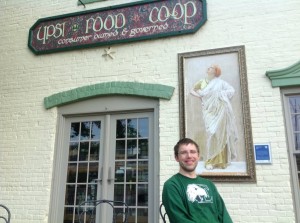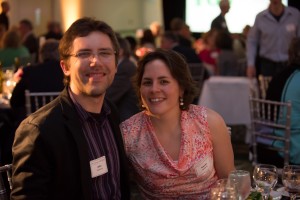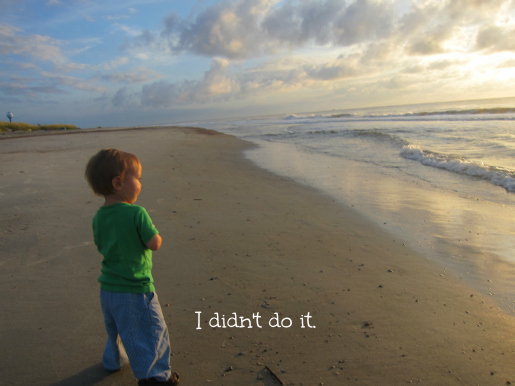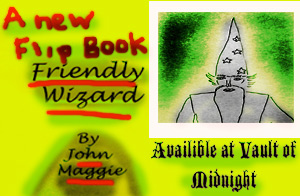Last October, I spent a weekend locked up in a cabin, surrounded by bears, somewhere in the vicinity of Lake Tahoe, with my friends; Dan, Matt, Dave and Mike. Collectively, as some of you know, we’re known as the Monkey Power Trio, and, when we were in Nevada, we celebrated our 18th anniversary as the world’s longest-running one-day-a-year band. Following are my rough notes about the session, written as I sat in the Reno airport, waiting for a blizzard to let up, so that I could make my way home. I’m sure that my plan was to post these notes here on the site upon my return home, but somehow I must have forgotten. I’m sorry if any of you MPT fans out there have been waiting on pins and needles all this time.
SO, HERE’S WHAT HAPPENED OUR 18TH DAY/YEAR AS A BAND:
 • The other guys all flew into Reno the day before I did. I couldn’t get away due to obligations associated with my job. That entire day, as I was hard at work, trying to tie up loose ends, I kept receiving photos from them, documenting their decent into drunken stupor in a second-tier Reno casino. There were lots of group photos, all accompanied by captions stating things like, “Official Monkey Power Group Photo 2012… All the guys are together again.” I got the photo to the right the night before I left, as I was cleaning baby poop from the railing of my son’s crib. (He’d finally discovered how to remove his own diaper and fling his poop.) It’s one of a series of Mike and Dave accompanied by a couple of waitresses in a white tunics, who they’d someone convinced to participate, jumping up and high-fiving one another, enjoying their time without me.
• The other guys all flew into Reno the day before I did. I couldn’t get away due to obligations associated with my job. That entire day, as I was hard at work, trying to tie up loose ends, I kept receiving photos from them, documenting their decent into drunken stupor in a second-tier Reno casino. There were lots of group photos, all accompanied by captions stating things like, “Official Monkey Power Group Photo 2012… All the guys are together again.” I got the photo to the right the night before I left, as I was cleaning baby poop from the railing of my son’s crib. (He’d finally discovered how to remove his own diaper and fling his poop.) It’s one of a series of Mike and Dave accompanied by a couple of waitresses in a white tunics, who they’d someone convinced to participate, jumping up and high-fiving one another, enjoying their time without me.
 • Thankfully, I didn’t have to spend much time in Reno, which is one of my least favorite places in the entire United States. I despise Vegas, but Reno is worse. It’s Vegas without the attractive people. The good news is our time spent there inspired us artistically. Our best song of the session, entitled “Hit Me ‘Till I Win,” wouldn’t have existed if not for the fact that we had experienced the wretched misery that is Reno. I can’t, off the top of my head, remember all of the lyrics, but I do recall describing Reno as a place where crippled people walk again. I liked that. (In the song, I describe Reno as the happiest place on earth, where people come to turn their lives around. The image of obese people with oxygen tanks riding their scooters up to gambling tables and pulling themselves up, I thought, was a great illustration of these restorative powers of Reno.)
• Thankfully, I didn’t have to spend much time in Reno, which is one of my least favorite places in the entire United States. I despise Vegas, but Reno is worse. It’s Vegas without the attractive people. The good news is our time spent there inspired us artistically. Our best song of the session, entitled “Hit Me ‘Till I Win,” wouldn’t have existed if not for the fact that we had experienced the wretched misery that is Reno. I can’t, off the top of my head, remember all of the lyrics, but I do recall describing Reno as a place where crippled people walk again. I liked that. (In the song, I describe Reno as the happiest place on earth, where people come to turn their lives around. The image of obese people with oxygen tanks riding their scooters up to gambling tables and pulling themselves up, I thought, was a great illustration of these restorative powers of Reno.)
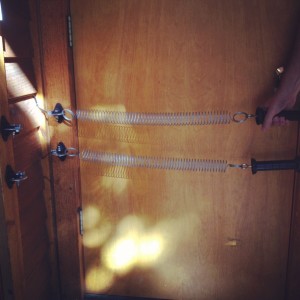 • Most of our time was spent at the cabin. I believe the area we were in was called Squaw Valley. It was beautiful. The stars at night were insanely bright, and seemed close enough to jump up and poke your eyes out on. Unfortunately, though, I only got to look up at them for a few minutes, as I was convinced that the bears could smell the bacon grease on me. (I’d fried up three pounds of bacon immediately upon arriving at the cabin.) I never saw a bear, but their presence loomed large. What appeared to be high-voltage slinkies were strung across all of the cabin’s doors and windows, and the large metal garbage enclosure, which stood right at the end of the driveway, was covered in wet, rump roast-sized snout marks.
• Most of our time was spent at the cabin. I believe the area we were in was called Squaw Valley. It was beautiful. The stars at night were insanely bright, and seemed close enough to jump up and poke your eyes out on. Unfortunately, though, I only got to look up at them for a few minutes, as I was convinced that the bears could smell the bacon grease on me. (I’d fried up three pounds of bacon immediately upon arriving at the cabin.) I never saw a bear, but their presence loomed large. What appeared to be high-voltage slinkies were strung across all of the cabin’s doors and windows, and the large metal garbage enclosure, which stood right at the end of the driveway, was covered in wet, rump roast-sized snout marks.
 • In spite of the bears, we did some exploring during the day, both alone an together. The morning of the session itself, we took turns leaving alone, and venturing up the “fire road” which led to the peak of the mountain we were living on. It was Dan’s idea. He said that we should all have a “vision quest” and come back with a song. Dan came back with a song about a new species of monkey that was just discovered. Dave came back with a song about man at a flea market who imagined himself to be Al Green. I can’t remember what Matt and Mike came back with, but my contribution was a song about a man looking to end white male domination by having children with women of color. (It was brought about by the realization that, even though all of us in the band are white, the four sons that we’ve produced thus far are not.) I don’t know that it’ll make the record, but I like knowing that it’ll be there in the archive for our kids to one day have to deal with.
• In spite of the bears, we did some exploring during the day, both alone an together. The morning of the session itself, we took turns leaving alone, and venturing up the “fire road” which led to the peak of the mountain we were living on. It was Dan’s idea. He said that we should all have a “vision quest” and come back with a song. Dan came back with a song about a new species of monkey that was just discovered. Dave came back with a song about man at a flea market who imagined himself to be Al Green. I can’t remember what Matt and Mike came back with, but my contribution was a song about a man looking to end white male domination by having children with women of color. (It was brought about by the realization that, even though all of us in the band are white, the four sons that we’ve produced thus far are not.) I don’t know that it’ll make the record, but I like knowing that it’ll be there in the archive for our kids to one day have to deal with.
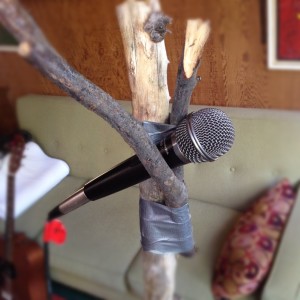 • As usual, a disproportionate number of my contributions involved sex and impregnation. In addition to the “seminal warrior” song referenced above, I also had a punk song called “Out Fuck The Rich,” which is about our need to have more children than our well-financed adversaries.
• As usual, a disproportionate number of my contributions involved sex and impregnation. In addition to the “seminal warrior” song referenced above, I also had a punk song called “Out Fuck The Rich,” which is about our need to have more children than our well-financed adversaries.
• Speaking of sexy songs, this year, I believe, was the first in recent history in which we didn’t attempt a song about panties. I had an idea for a song called “Prehistoric Panty Dampner,” but it never came to fruition. (Our last panty song, as I recall, was Panty Groove.)
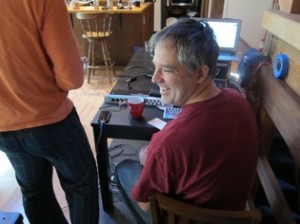 • The cabin, as I understand it, was lent to us by a family in San Francisco. The husband is an intellectual property attorney. The wife is running for elected office of some kind. Apparently Dan knew them years ago, when they were all young people living in New York, before the 9/11 exodus. A mutual friend, from what I understand, had gotten to know this couple as a result of the fact that they let their dogs run around together in the same park. And, now, well over a decade later, we’re making noise in their cabin. Dan just put something up on Facebook, letting people know that we were looking for a location, and these folks came though with an offer. I think that’s really cool. (For what it’s worth, we’re now accepting offers for our 2013 session… Oh, and it’s worth nothing that we’re incredibly clean. With the exception of one time in Savannah, we always leave places better than we find them.)
• The cabin, as I understand it, was lent to us by a family in San Francisco. The husband is an intellectual property attorney. The wife is running for elected office of some kind. Apparently Dan knew them years ago, when they were all young people living in New York, before the 9/11 exodus. A mutual friend, from what I understand, had gotten to know this couple as a result of the fact that they let their dogs run around together in the same park. And, now, well over a decade later, we’re making noise in their cabin. Dan just put something up on Facebook, letting people know that we were looking for a location, and these folks came though with an offer. I think that’s really cool. (For what it’s worth, we’re now accepting offers for our 2013 session… Oh, and it’s worth nothing that we’re incredibly clean. With the exception of one time in Savannah, we always leave places better than we find them.)
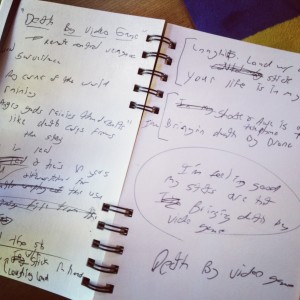 • The music part of what we do is fun, but the thing, I think, that keeps us all coming back year after year, is the opportunity to commiserate about our lives, which are constantly changing. We talk about marriages and kids, jobs that we may not necessarily always find rewarding, our various physical ailments, and how we’re handling the stress of everyday life. At the risk of making our outings sound too new agey, they’re sometimes like intense male encounter groups… only, instead of tears and hugging, there are debilitating personal attacks aimed at one another’s perceived weaknesses, and endless sarcastic assaults. This year, the guy whose wife left him was the primary target, although the size of my stomach got some unwanted attention, after an incident transpired which required the immediate removal of my shirt.
• The music part of what we do is fun, but the thing, I think, that keeps us all coming back year after year, is the opportunity to commiserate about our lives, which are constantly changing. We talk about marriages and kids, jobs that we may not necessarily always find rewarding, our various physical ailments, and how we’re handling the stress of everyday life. At the risk of making our outings sound too new agey, they’re sometimes like intense male encounter groups… only, instead of tears and hugging, there are debilitating personal attacks aimed at one another’s perceived weaknesses, and endless sarcastic assaults. This year, the guy whose wife left him was the primary target, although the size of my stomach got some unwanted attention, after an incident transpired which required the immediate removal of my shirt.
• There were no walk-outs this year. There were no fights to speak of. Those of us who are typically grumpy, weren’t. No one had that glazed look, where you thought that he really didn’t want to be there. This, I think it’s safe to say, is somewhat unusual.
• Lessons learned this year… Snacking throughout the session is probably better than stopping to eat a meal. Our intention was to play all night, but, after grilling out burgers, we all just fell asleep… The idea of an early-morning vision quest, in which each of us heads into nature to write a song in solitude is also something that we should incorporate into our annual sessions going forward.
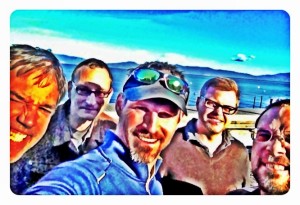 • Final thoughts… I didn’t go into this session expecting to have a great time. Maybe it was the taunting by way of text message that preceded the session, or the fact that, in order to get to the cabin, we had to make our way through Donner Pass, where, a century-and-a-half before, good friends had engaged in eating one another. As it turns out, though, I enjoyed myself quite a bit, just sitting around with old friends, drinking beer, and occasionally yelling out some nonsense about the importance of making babies and sending them into space. It’s good to have an excuse to do this every year. And it’s extra-special-fun when we occasionally stumble upon a song where everything clicks.
• Final thoughts… I didn’t go into this session expecting to have a great time. Maybe it was the taunting by way of text message that preceded the session, or the fact that, in order to get to the cabin, we had to make our way through Donner Pass, where, a century-and-a-half before, good friends had engaged in eating one another. As it turns out, though, I enjoyed myself quite a bit, just sitting around with old friends, drinking beer, and occasionally yelling out some nonsense about the importance of making babies and sending them into space. It’s good to have an excuse to do this every year. And it’s extra-special-fun when we occasionally stumble upon a song where everything clicks.
Given the fact that we’re already several years behind when it comes to releasing the songs created at these annual sessions of ours, you shouldn’t expect to hear anything recorded in this cabin for at least four years.
UPDATE: Dave tells me that our song about Reno, which I mentioned as being the best thing we’d done all session, has been lost. So, I guess you’ll just have to take my word for it when I say that it was probably the best thing produced by human beings in 2012.

